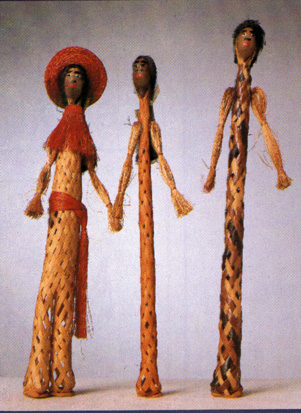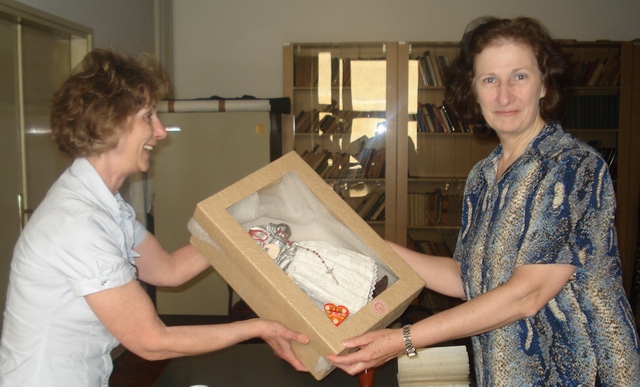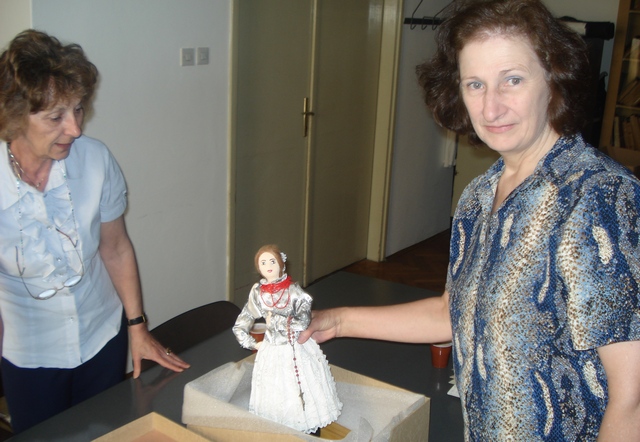Envoys
Etnographic Museum, Zagreb
 ...What is a doll?
Innocent object of carefree children's game? Aid in
acquiring first life experiences? Artificial expression of man's
creative ability? Product and reflection of acquired cultural
sophistication?Souvenir? Symbol of identity? Materialized expression
through which we represent oursevles, our people? Choosing among many
explanations offered by ethnology, history, art and aesthetics,
conciously and intentionally I singled out this one: "Simultaneously, a
doll brings nations together and apart, channeling, if we may say so,
the power of their passions into cradle of common acestors and legends.
A doll takes over all this energies and finally gains a huge magical
power. A doll could express something that nobody dares to say openly:
it is a hero of secret wishes and hidden thoughts, it is a descrete
confession of oneself to others and himself." (J. Hevalier, A.
Gheerbrant: "Rjecnik simbola", p. 364, Zagreb 1983.)
...What is a doll?
Innocent object of carefree children's game? Aid in
acquiring first life experiences? Artificial expression of man's
creative ability? Product and reflection of acquired cultural
sophistication?Souvenir? Symbol of identity? Materialized expression
through which we represent oursevles, our people? Choosing among many
explanations offered by ethnology, history, art and aesthetics,
conciously and intentionally I singled out this one: "Simultaneously, a
doll brings nations together and apart, channeling, if we may say so,
the power of their passions into cradle of common acestors and legends.
A doll takes over all this energies and finally gains a huge magical
power. A doll could express something that nobody dares to say openly:
it is a hero of secret wishes and hidden thoughts, it is a descrete
confession of oneself to others and himself." (J. Hevalier, A.
Gheerbrant: "Rjecnik simbola", p. 364, Zagreb 1983.)
I think that this interpretation of phenomenon of a doll is best description of King of Dolls' collection and his intention, a framework of systematic creation of new United Nations governed by peace undisturbed by race, language, writing, religion, culture, or economic differences... Mr. Ljeposlav Perinic, admirer of Croatian national costume, a patriotic propagator and careful father, devoted himself completely to relization of basic idea: to ask by letter the leading representatives of states and world institutions for al doll in national costume that could bring closer the folklore - national costume of country of origin, confirming simultaneously the equality of all children in the world.
 The initiator of this idea was his daughter Vesna, then 10 years old
who, besides Croatian, wanted to know other peoples' costumes by owning
their dolls. Father's intention and wish to please his daughters and
enable them to know and understand other values, in course of time
overgrew its frame. Before long, the Perinic family started to receive
mail parcels. Even negative answers (for example: QUeen Elizabeth II,
Charles de Gaulle, Jacqueline Kennedy...) did not discourage efforts to
present Croatia, to use "ordinary dolls" to bring closer together
individuals and nations into harmonious rhythm moved by understanding,
tolerance, goodwill and friendship, to live side by side and not
confronted... Every doll in this collection has a seal of its fate.
Each represents a country of its origin, even when the one who asked
and the donor did not understand other correctly. Each one of them
witnesses about the creativity of its people. And each one is,
simultaneously, a clear reflection of donor's spirit, social and
political presentation of "chosen" subjects, of moral and easthetic
principles. A doll, this unusual envoy of goodwill, regularly travels
accompanied by letter...
The initiator of this idea was his daughter Vesna, then 10 years old
who, besides Croatian, wanted to know other peoples' costumes by owning
their dolls. Father's intention and wish to please his daughters and
enable them to know and understand other values, in course of time
overgrew its frame. Before long, the Perinic family started to receive
mail parcels. Even negative answers (for example: QUeen Elizabeth II,
Charles de Gaulle, Jacqueline Kennedy...) did not discourage efforts to
present Croatia, to use "ordinary dolls" to bring closer together
individuals and nations into harmonious rhythm moved by understanding,
tolerance, goodwill and friendship, to live side by side and not
confronted... Every doll in this collection has a seal of its fate.
Each represents a country of its origin, even when the one who asked
and the donor did not understand other correctly. Each one of them
witnesses about the creativity of its people. And each one is,
simultaneously, a clear reflection of donor's spirit, social and
political presentation of "chosen" subjects, of moral and easthetic
principles. A doll, this unusual envoy of goodwill, regularly travels
accompanied by letter...

Prime Minister of the Republic of Croatia, in May 2010 (a doll in Croatian national costume from Podravina, made in ~1950). It was handed over to her by Mrs. Ivanka Ivkanec (on the left) in the Ethnographic Museum in Zagreb.

Vesna, Zdravka and Dubravka spent their childhood and maiden years in family home by playing with dolls clad in Croatian national costumes from Konavle and Posavina. This small and favourite group of dolls was enlarged in 1962 by first two donated dolls: from Mexico by First Lady Eva Samano de Lopez Mateos, and from Germany by Dr. Konrad Adenauer...
King and bard of dolls proudly carries a flag and shield of homealnd that needs love, peaceful freedom, cooperation, harmony and unity of cultural inheritance with new achivements. Dolls and letters received from distinguished persons from all over the world constantly enlarge the value of Collection Perinic. It is also our wish, from bottom of our hearts, to enable following generations to have a permanent opprotunity of seeing the collection, and that its ideals become a life-guiding principle of every man!...
(translated from Croatian by Damodar Frlan, director of the Ethnographic Museum in Zagreb)